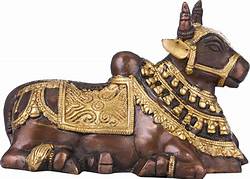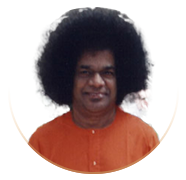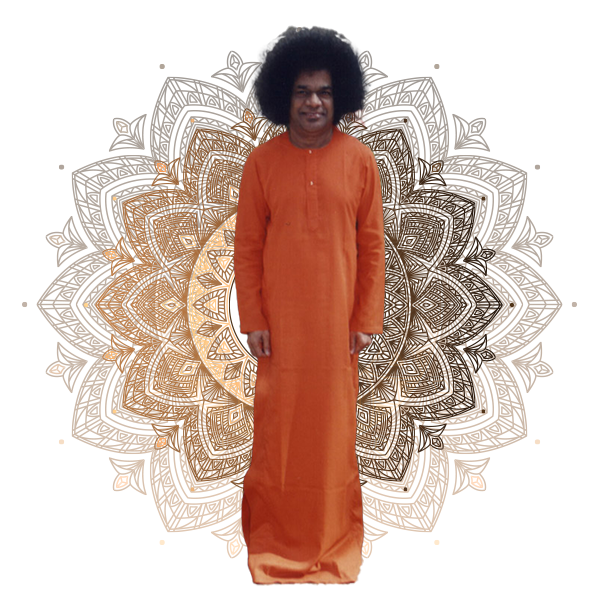DESCRIPTION
The statute of the Nandi
Nandi, (‘The Happy One’) Shiva’s divine vehicle is represented as a white bull, symbolizing purity and justice. An image/statue of Nandi is placed in the outer hall of Shiva temples, and looks towards Shiva. Shiva and Nandi’s symbolic association can be traced back to the days of the Indus valley civilization. During those ancient times, dairy farming was one of the primary occupations, thus explaining the appearance of various artifacts indicating a deity much like Shiva. This deity is believed to have been worshipped as the keeper of herds. This deity over time was converted into the present day Shiva, with the bull Nandi as his primary vehicle. The name Pashupatinath – or lord of creatures – can also be ascribed to the ancient deity of the people of the Indus Valley Civilization. Nandi himself later acquired the status of a lesser God and there are several temples in India dedicated independently to Nandi. However the presence of a statue of Nandi at the gate of the Garbha Griha (sanctum sanctorum) of every Shiva temple is a must and marks the close association of Shiva with Nandi.
According to some, Nandi is not a bull in the ordinary sense, but a divine being, and a close confidant of Lord Shiva, whose anthropomorphic form is represented by a half human and half bull body. He is known for his knowledge, devotion, obedience, surrender, virtue, and dedication to Shiva and his devotees of Shiva, and fought many battles to protect the gods, slay the demons and uphold dharma. As the vehicle of Shiva, Nandi represents knowledge, scholarship, devotion, surrender, renunciation, obedience, strength and virility.
Lord Shiva is known as Vrishabhanath, lord of the bulls. In Sanskrit, a bull is called Vrisha, which has another connotation – that of righteousness or Dharma. Thus through Nandi, righteousness or Dharma become an integral part of Shiva’s aura. On specific occasions, Hindus worship bulls and make them offerings of food. Since they are considered sacred, as in case of cows, hurting or harming them is strictly prohibited in Hinduism.

-
[12] 5.0 - 5.5.1 >Prakarams of Mukthi Stupi
- 5.0.1 - Apsaras
- 5.1 - First Prakaram of Stupi
- 5.2 - Second Prakaram of Stupi
- 5.2.1 - Sri Sathya Sai Baba Padukas
- 5.3 - Third Prakaram of Stupi
- 5.3.1 - Sri Kakabhujandar
- 5.3.2 - Sri Bahula Devi
- 5.4 - Fourth Prakaram of Stupi
- 5.5 - Fifth Prakaram of Stupi
- 5.5.1 - Mukthi Stupi
-
[18] 101-109 >Munis & Consorts-part B
- 101.0 - Kutsar
- 101.1 - Anugraha Devi
- 102.0 - Roma Rishi
- 102.1 - Prema
- 103.0 - Adi
- 103.1 - Anupama
- 104.0 - Shukracharya
- 104.1 - Sukeerti
- 105.0 - Durvasar
- 105.1 - Indira
- 106.0 - Angirasar
- 106.1 - Akshaya Devi
- 107.0 - Pulasthiyar
- 107.1 - Rama Devi
- 108.0 - Pulaha
- 108.1 - Manohari
- 109.0 - Vyagrapada
- [12] 5.0 - 5.5.1 >Prakarams of Mukthi Stupi
- 5.0.1 - Apsaras
- 5.1 - First Prakaram of Stupi
- 5.2 - Second Prakaram of Stupi
- 5.2.1 - Sri Sathya Sai Baba Padukas
- 5.3 - Third Prakaram of Stupi
- 5.3.1 - Sri Kakabhujandar
- 5.3.2 - Sri Bahula Devi
- 5.4 - Fourth Prakaram of Stupi
- 5.5 - Fifth Prakaram of Stupi
- 5.5.1 - Mukthi Stupi
-
[18] 101-109 >Munis & Consorts-part B
- 101.0 - Kutsar
- 101.1 - Anugraha Devi
- 102.0 - Roma Rishi
- 102.1 - Prema
- 103.0 - Adi
- 103.1 - Anupama
- 104.0 - Shukracharya
- 104.1 - Sukeerti
- 105.0 - Durvasar
- 105.1 - Indira
- 106.0 - Angirasar
- 106.1 - Akshaya Devi
- 107.0 - Pulasthiyar
- 107.1 - Rama Devi
- 108.0 - Pulaha
- 108.1 - Manohari
- 109.0 - Vyagrapada




